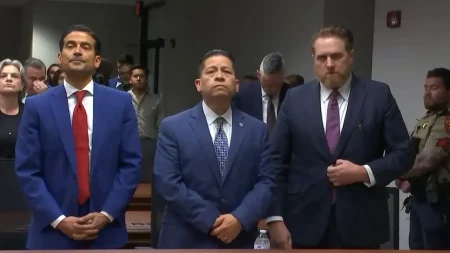Trump Expresses Strong Dissatisfaction with Recent Developments
President Voices Concern Over Controversial Situation, Signaling Potential Policy Shift
In a notable display of frustration that has rippled through Washington’s political landscape, President Donald Trump has expressed significant dissatisfaction with a recent series of events, stating he was “very unhappy about the way that went down.” The president’s remarks, delivered during what observers described as a particularly tense exchange with reporters, highlight growing tensions within the administration as it navigates multiple domestic and international challenges simultaneously. While the specific situation referenced remained somewhat ambiguous, the president’s tone and word choice suggested a matter of considerable importance that had failed to meet his expectations or strategic objectives.
The president’s comments came amid a backdrop of escalating pressure from various fronts, including congressional oversight initiatives, international trade negotiations, and ongoing domestic policy implementations that have faced both procedural and political obstacles. “When I look at what happened and how it unfolded, I can tell you right now that I’m very unhappy about the way that went down,” Trump emphasized, his voice reportedly carrying a distinct edge that White House correspondents have come to recognize as indicative of genuine displeasure rather than performative politics. Sources close to the administration suggested that the president’s frustration stemmed from what he perceived as a breakdown in proper procedural execution, though they remained guarded about specific details. This pattern of expressed disappointment follows several recent instances where the president has publicly distanced himself from outcomes that failed to align with his administration’s stated goals or personal expectations.
Administrative Response and Internal Dynamics Reveal Deeper Institutional Tensions
White House officials have scrambled to address the president’s concerns, with senior advisors engaging in extended strategy sessions throughout the week to formulate appropriate responses to the situation that triggered Trump’s dissatisfaction. Press Secretary Kayleigh McEnany attempted to provide context during yesterday’s briefing, suggesting that the president’s remarks reflected his commitment to “perfect execution” rather than acceptance of “adequate results” in matters of national importance. “The president demands excellence in all aspects of governance,” McEnany stated, “and when processes fail to meet those standards, he believes the American people deserve to know his unvarnished assessment.” This explanation, however, did little to clarify the specific circumstances that prompted Trump’s expression of unhappiness, leading to intensified speculation among political analysts and increased questioning from the White House press corps.
The internal dynamics within the administration have reportedly shifted in response to the president’s displeasure, with several key staffers described by insiders as working extended hours to rectify whatever issues lay at the heart of Trump’s concerns. According to a senior administration official speaking on condition of anonymity due to the sensitive nature of internal deliberations, “The president expects his team to anticipate problems before they materialize and to implement solutions with precision. When that doesn’t happen, he’s not someone who hides his disappointment.” This sentiment reflects a management style that Trump brought from his business background—direct, results-oriented, and unafraid to express dissatisfaction when expectations aren’t met. However, the translation of this approach to governance has created ripple effects throughout various departments as officials attempt to interpret and address the president’s specific concerns while maintaining their ongoing responsibilities during a particularly challenging period for the administration.
Political Ramifications and Opposition Response Highlight Partisan Divide
Democratic leaders have seized upon the president’s expression of dissatisfaction, characterizing it as further evidence of what they describe as an administration in disarray. Senate Minority Leader Chuck Schumer issued a statement suggesting that “the president’s unhappiness might be better directed at examining his own leadership rather than casting blame elsewhere.” This sentiment was echoed by House Speaker Nancy Pelosi, who remarked during a scheduled press conference that “expressions of presidential displeasure without transparent explanations serve neither the administration nor the American people.” These responses underscore the intensely partisan environment in which even expressions of administrative frustration become fodder for political positioning and messaging strategies on both sides of the aisle.
Republican allies have offered a markedly different interpretation of the president’s comments, framing his expression of unhappiness as evidence of his commitment to high standards and willingness to demand accountability. Senator Lindsey Graham characterized Trump’s remarks as “refreshingly honest” and indicative of a leader who “doesn’t settle for mediocrity.” Representative Jim Jordan similarly defended the president’s position, suggesting that “the American people elected someone who speaks his mind and demands results—that’s exactly what we’re seeing.” This divergence in interpretation highlights how expressions of presidential dissatisfaction are filtered through partisan lenses, with supporters viewing them as strength and opponents framing them as dysfunction. Political analysts note that this dynamic has become increasingly pronounced during Trump’s presidency, with nearly every statement or expression of emotion becoming subject to dramatically different interpretations based on political alignment.
Historical Context and Governance Patterns Suggest Broader Implications
Presidential expressions of dissatisfaction have historical precedents that provide useful context for understanding Trump’s recent remarks. From Truman’s famous “the buck stops here” philosophy to Obama’s reported frustration with the healthcare.gov rollout, American presidents have long struggled with the gap between executive vision and bureaucratic implementation. What distinguishes Trump’s approach, according to presidential historians, is both the public nature of his expressions of unhappiness and the frequency with which he distances himself from outcomes that don’t meet his expectations. Dr. Martha Keller, presidential scholar at Georgetown University, notes that “Trump’s willingness to publicly express dissatisfaction represents a departure from the more measured tones traditionally adopted by presidents when facing setbacks. This reflects both his unconventional path to the presidency and his distinct communication style that prioritizes directness over diplomatic restraint.”
This latest expression of presidential dissatisfaction also raises questions about accountability structures within the administration and how responsibility is assigned when initiatives fail to meet expectations. “When a president says he’s ‘very unhappy about the way that went down,’ he’s simultaneously expressing genuine frustration while also creating distance between himself and whatever failure occurred,” explains political scientist Robert Thornton. “This creates a complex dynamic where the president maintains his position as the ultimate authority while also suggesting that implementation failures occurred despite, rather than because of, his leadership.” As the administration continues navigating multiple domestic and international challenges, observers across the political spectrum will be watching closely to see whether this expression of unhappiness translates into meaningful policy adjustments, personnel changes, or simply remains a momentary expression of frustration during a particularly challenging period of governance.
Future Outlook and Strategic Implications Point to Evolving Administrative Approach
Looking ahead, presidential watchers and policy analysts suggest that Trump’s expressed unhappiness may signal potential shifts in both personnel and strategy as the administration recalibrates its approach to whatever situation prompted his concern. “Presidents don’t typically voice dissatisfaction without some intention to change course,” notes veteran White House correspondent Eleanor Simmons. “The question now becomes whether we’ll see substantive adjustments in policy direction, staffing configurations, or communication strategies in response to whatever triggered this frustration.” This perspective aligns with historical patterns where presidential expressions of unhappiness frequently precede significant operational or strategic pivots, particularly in administrations that place high value on loyalty and results.
The timing of Trump’s remarks also carries potential significance as the administration faces multiple critical decision points across domestic and international domains. With ongoing negotiations regarding economic stimulus measures, evolving foreign policy challenges, and the continuous demands of pandemic response, expressions of presidential dissatisfaction can reverberate throughout complex policy ecosystems, influencing everything from market confidence to diplomatic relationships. “When the president expresses that he’s ‘very unhappy about the way that went down,’ it creates ripple effects far beyond the specific situation he’s referencing,” explains Dr. Jonathan Keller, international relations specialist at American University. “Allies, adversaries, markets, and domestic constituencies all parse these statements for clues about future direction and priorities.” As the administration continues navigating these multifaceted challenges, the president’s expressed unhappiness serves as both a reflection of past disappointments and a potential indicator of future adjustments in an administration that continues to prioritize decisiveness and directness even when confronting setbacks or disappointments.










